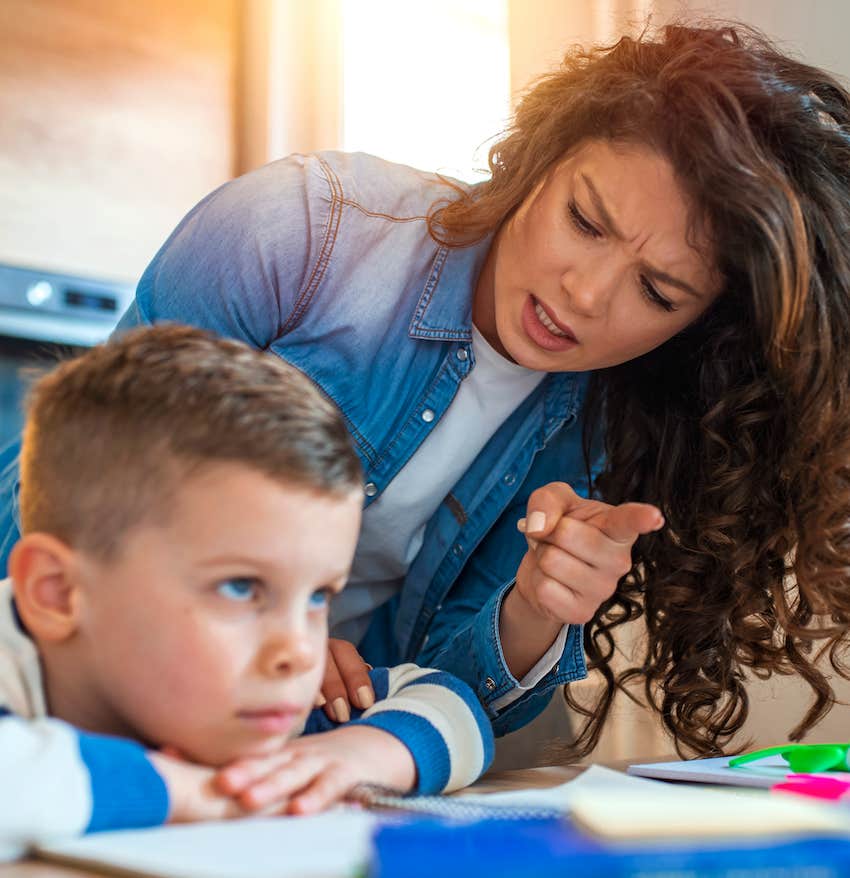For Anyone Who Wants To Move Past A Crappy Childhood
Acknowledge, accept, embrace and release.
 Maryia Plashchynskaya | Canva
Maryia Plashchynskaya | Canva We've all heard the phrase "unhappy childhood," but what does that mean, exactly? Does a childhood that includes trauma or abuse affect you as an adult? How can we make peace with what happened in the past?
YourTango sat down with experts Carol Freund, Jane Warren, and Larry Cappel to get to the bottom of this difficult issue.
This is for anyone who wants to move past a crappy childhood:
1. What is an unhappy childhood?
Cappel outlined some things that might contribute to an unhappy childhood, although he noted, "These things can contribute to an unhappy childhood. However, in a home with enough unconditional love from the caregiver to a child, it's possible to grow up happy despite these obstacles:"
- Being poor, though poverty by itself does not guarantee an unhappy childhood
- Being raised by a single -parent
- Experiencing a divorce during your childhood
- Being in a home with a parent or sibling with a severe physical or mental illness
- Losing a parent, sibling, or other close loved one"
Warren explained that problems can begin even before birth, "We're all impacted by the events that occurred and the messages we heard when we were growing up. Even the events that were occurring and the emotions that were flowing within our mother while she was carrying us impacted us. And possibly back before that as well." An article on early emotional development and primitive mental states in the British Journal of Psychotherapy explores this emotional transference.
Did you have a hard childhood? What made it hard? How do you define 'hard'? What makes one person's childhood hard and another's easy? Yes, we have certain measures and indicators of abusive behavior that children can be subjected to, and on the end of the scale, these create extremely difficult childhoods that would be hard for most people to process and integrate into the remainder of their lives.
 Dragana Gordic via Shutterstock
Dragana Gordic via Shutterstock
2. Everyone's unhappy childhood isn't the same
Freund explained that what constitutes "unhappy" might be different for everyone, saying, "It's not always the big things that make children unhappy. When I was a kid, my immigrant mother was so busy trying to succeed in this new country that she didn't have time for a kid's conversation.
"I didn't know this was a problem for me until I had my kids. I loved to listen to my daughter. I even remember some of her bits of wisdom. My mother worked hard, and I would have felt selfish to admit that I was sad and needed more attention.
Not until I was older and consistently felt discounted in relationships did I trace the feeling back to the experiences of my younger self. The Journal of Couple & Relationship Therapy published a study exploring self-sabotaging behaviors that supports how only after looking to my past could I stop sabotaging my present-day relationships."
Warren went on to discuss the complex fact that what's "hard" for one person may not be for another: "If you grew up in a family that yelled and screamed when they were angry, does this make your childhood 'hard'?
"We know people who have descriptions of their childhood experiences that are eerily similar. Yet, one of them repeats the behavior she was exposed to, another has adopted a more passive-aggressive approach to life, and a third can express their needs openly, cleanly, calmly and navigate her adult life with little stress or worry.
"Didn't they all have the same 'hard' childhood? Your fundamental personality traits will play a big part in determining how you react to your childhood circumstances.
As you grow into adulthood and if you are willing to become aware and curious about the circumstances of your life and how those circumstances continue to impact your behaviors and beliefs, you have an increasing amount of choice about how to move beyond (or deeply integrate) these childhood experiences.
Research published in the Journal of Human Behavior in the Social Environment discusses how the effects of those experiences can creep up on you. As Freund explained, "Often, I hear adults come face to face with a childhood unhappiness they didn't know they had until they began to see a pattern of thought or behavior that just doesn't make sense."
3. How do you get "happy" adulthood out of a "hard" childhood?
Cappel said, "Happy has become a loaded term in the USA. For the most part, advertising tells us what 'happy' is supposed to be. If you purchase the right car, clothes, beer, house, etc., then you will be happy. The subtle message of commercials tells us that 'unhappy' is caused by not doing what the commercial says.
"The appropriate Buddhist term I'd like to replace 'happy' with is equanimous, the experience of equanimity. It can best be described as the ability to experience an even-keeled content acceptance of life, regardless of what pleasant or unpleasant thing might be happening at any given moment." Pastoral Psychology published a systematic review of the literature exploring the use of equanimity in mindfulness-based interventions
It's the ability to experience the full range of human emotions ranging from ecstatic joy to the deepest sorrow, with an even-keeled quality of being present and aware of your experience of your life in every moment with total acceptance.
4. The role of attunement in difficult childhoods
So, what kind of things happen during childhood that causes us to struggle to be fully present with ourselves as adults?
What happens to make us tune out with drugs, alcohol, TV, etc., to get into a relationship to feel better about ourselves, to be anxious, depressed, or unable to be relaxed or present around others? To answer this, we need to understand a tiny amount of developmental psychology.
Children have immature nervous systems that mature and form based on their interactions with the world and the people in it. The way this happens between a parent and child is through the use of empathy and attunement, as investigated by a study in the Infant Mental Health Journal. Attunement is sort of like intuition.
With it, you can understand what your child is experiencing even when they can't tell you with words and then reflect that experience to them, you are attuning. Empathy is the ability to respond to another with kindness, compassion, and a gut-level understanding of their experience, absent of criticism or judgment.
When a caregiver attunes to and is empathetic in their responses, then the child feels understood and valued. It serves as a mirror for them to see themselves as a good person. This positive experience with the adult allows a child to feel secure and permits them to be natural and relaxed. They can grow into relaxed, secure, and productive adults.
If, as a child, you were not treated with empathy and attunement, you may find yourself an unhappy adult.
 PeopleImages.com - Yuri A via Shutterstock
PeopleImages.com - Yuri A via Shutterstock
5. How do you know if you are unhappy?
- You don't feel secure and worry about safety, money, or something else.
- You don't like who you are and try to hide it by pretending to be someone you are not.
- You regret your past and get down on yourself often.
- Your mind runs a mile a minute, and you are always imagining future scenarios that don't happen.
- You hate your body or how you look.
6. You can move forward after an unhappy childhood
Warren offered some real, actionable advice for how to move forward and upward after an unhappy childhood:
- Face and accept the things that happened to you happened. No, they weren't helpful or pleasant. No, you didn't request these circumstances deserve the treatment you received, and there is no good rationale or excuse that needs to be made for anyone else’s behavior. It just was.
- Shower yourself with love and appreciation for being here today and facing the circumstances of your life. Commit to moving beyond the automatic actions and reactions that these circumstances instilled in you.
- Wonder about the gifts. As a result of these circumstances, there are likely benefits that you can identify (this is not about making these circumstances a 'good' thing; it's about harvesting what you can from the reality of your life). Were you belittled and bullied as a child? Has that created your compassion for those in similar circumstances? Has it created a discernment of nuances of words and their impact? Has it created self-reliance that allows you to step aside from people who perpetuate belittling and bullying?
- Choose what it is that you want concerning your behaviors and responses.
- Take a small, visible action that moves you in a new direction.
 PeopleImages.com - Yuri A via Shutterstock
PeopleImages.com - Yuri A via Shutterstock
Cappel also has suggestions for how to move forward:
- Find a good therapist who can help you.
- Work through the grief and the pain of the past.
- Understand the reasons why things were like they were.
- Grieve the loss and then let the past go.
- Come to realize at a gut level that you can be happy.
- Change your self-defeating thoughts into positive ones.
- Learn to love yourself just as you are without criticism and judgment.
Freund encourages us to embrace and acknowledge our past: "Trying to dismiss what's there is likely to trap us into reliving the past. And the more real people are about what's inside of them, the more giving they can be to others."
She also has tips for healing and moving on, no matter what your childhood looked like:
- Allow yourself to acknowledge feelings. The ones that keep coming up and don't seem to make sense or that seem out of proportion may date back to childhood.
- Know that allowing feelings is not complaining or blaming; feelings don't make you weak, and they don't mean your parents didn't love you.
- Allow natural expression — crying, comforting yourself, accepting comfort.
- Change the way you deal with your unhappiness, as the old patterns can trap you—blocking, pretending, constantly blaming yourself or someone else.
- Think of sadness as rain. If you pretend it's sunny out, if you hate rain, or if it's raining harder somewhere else, you're still going to get wet. Your best bet is to get an umbrella and know the weather will change.
Cappel has these words of wisdom: "What we think we want from another is a desire to connect to some deeper part of ourselves. Learn to love yourself, then turn your love outward to others just as they are, appreciating their special qualities and uniqueness, instead of trying to use them to fill your sense of not being good enough."
Acknowledge, accept, embrace and release. Now, that is a true inspiration for healing.
YourTango is a purpose-driven publisher focused on love, relationships, emotional wellness, and self-empowerment.

